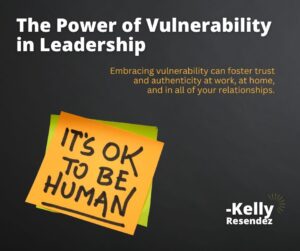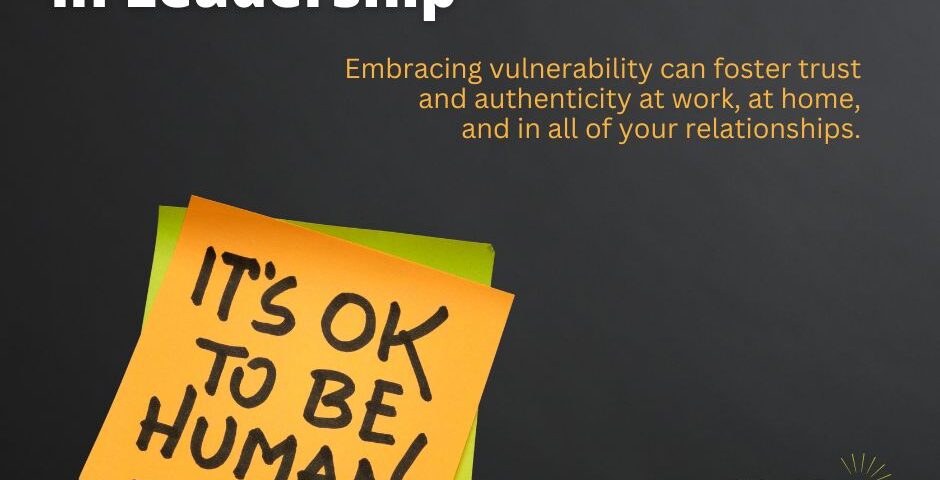
How to Engineer a Blue Zone.
August 22, 2024
Breaking the Cycle of Burnout: Sustainable Strategies for Long-Term Well-Being
October 15, 2024
Embracing vulnerability can foster trust and authenticity at work, at home, and in all of your relationships.
“Vulnerability is not winning or losing; it’s having the courage to show up and be seen when we have no control over the outcome.” – Brené Brown
In today’s fast-paced, high-stakes world, leaders are often expected to have all the answers. Whether it’s in a company, organization, in politics, or even at home, we ask our leaders to be decisive, steadfast, and project strength at all times. However, there is a growing recognition that the most effective leaders aren’t those who hide behind a façade of perfection but rather those who are willing to embrace and express vulnerability.
Vulnerability is often misunderstood as a weakness, but in truth, it is one of the most powerful tools a leader can possess. When we allow ourselves to be open, authentic, and even imperfect, we create the opportunity for deeper connection, a bridge to trust, and, ultimately, greater success in our relationships – both personal and professional.
Just think about the leaders you’ve admired the most. I’m pretty certain you weren’t drawn to them because they were flawless or larger than life but instead because they were real and genuine. They shared their struggles and allowed you to see them for who they truly are. This level of openness invites others to be vulnerable, too, giving others around them permission to be fully human.
Vulnerability is paramount for building trust.
At the core of every successful relationship is trust. Whether in business or in life, trust is what allows individuals and teams to function at their highest potential. Research supports this: a 2017 study published in the Harvard Business Review found that when leaders displayed vulnerability – by admitting mistakes, sharing personal stories, or asking for help – their employees were 20% more likely to take risks and speak up with innovative ideas.
Vulnerability promotes psychological safety.
When leaders are willing to be vulnerable – acknowledging mistakes, admitting when they don’t have all the answers, or showing emotions – they humanize themselves in the eyes of their team. This openness encourages a deeper level of trust, as people feel more connected to a leader who is authentic rather than one who always seems impenetrable.
And when teams feel safe to express their own challenges and doubts, they become more collaborative, innovative, and resilient.
Authenticity sparks greater innovation.
Vulnerability paves the way for greater creativity and innovation. When leaders are authentic, they give others permission to show up as their true selves. This creates an environment where diverse ideas can flourish, where risk-taking is encouraged, and where failure is seen as a necessary part of growth.
To that point, a study from Google’s Project Aristotle on high-performing teams highlighted the importance of vulnerability. It found that psychological safety (built on trust and the willingness to express vulnerability) was the most important factor in team success. Teams that reported feeling safe to be authentic with each other were more innovative and had higher overall performance.
Being vulnerable actually shows more emotional intelligence.
One of the foundational pillars of effective leadership is emotional intelligence, the ability to understand and manage your own emotions while also being attuned to the emotions of others. Vulnerability plays a crucial role in developing emotional intelligence. When leaders let their guard down and allow themselves to be vulnerable, they get more in touch with their own emotions and also can better relate to the emotional experiences of their team members.
This emotional awareness fosters a culture of empathy and understanding. Employees feel seen and valued, which leads to higher levels of engagement and loyalty.
According to a study by Catalyst, leaders who demonstrate vulnerability through empathy and inclusivity are more likely to inspire 61% of their employees to be innovative and 50% more engaged in their work.
Vulnerable leaders also demonstrate humility, showing that they are willing to learn and grow alongside their team.
Leading with courage, not perfection.
As you probably well know, it takes a whole lot of courage to be vulnerable, and that’s even more so when everyone is looking to you in a leadership role. It requires letting go of the need to appear perfect and instead embracing the reality that true leadership comes from being authentic. Of course, vulnerability is not about oversharing or constantly blithering on about your insecurities (it needs to be appropriate and authentic in its expression, too). But it is about finding the balance between strength and openness and showing up fully.
As leaders, when we embrace vulnerability we not only build deeper, more authentic relationships, but we also create a space where others feel empowered to do the same.
In a world that often equates leadership with a steel-jawed lack of emotion and total control, choosing vulnerability is a radical act of courage. It’s the key to fostering trust, driving innovation, and leading with heart.
My takeaway: Embrace the gift of imperfection.
No leader is perfect, and that’s okay. In fact, it’s our imperfections that make us relatable, approachable, and even more effective in our roles. By embracing vulnerability, we step into a new kind of leadership – one that is grounded in authenticity, trust, and the courage to be seen for who we truly are.
In your leadership journey, remember this: the most powerful leaders aren’t those who never falter, but those who rise by showing up with vulnerability and leading with heart.
“To share your weakness is to make yourself vulnerable; to make yourself vulnerable is to show your strength.”
– Criss Jami



